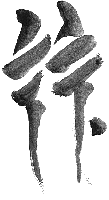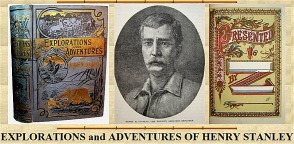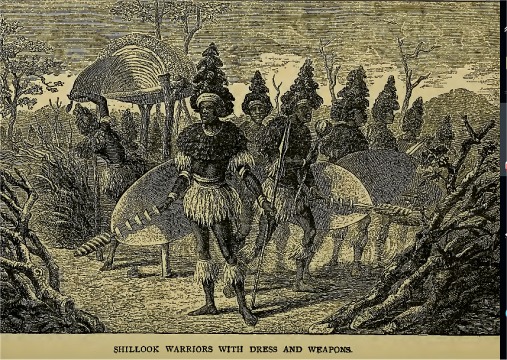STANLEY'S narrative in the preceding chapters
shows that he
entered the Dark Continent from the mouth of the Congo
on the
west coast, sailed up that river and finally entered
its tributary,
the Aruwimi. There he established a station and proceeded
over-
land with the object of reaching Wadelai, where Emin
Pasha was sup-
posed to be located. A reference to the -map of Central
Africa, which
the reader has already had an opportunity of scanning,
will show the
route that he took after Jeaving the river Aruwimi. It
was in this part
of the journey especially that the greatest obstacles
and dangers were
encountered. From the following narrative, related with
all of Mr.
Stanley's masterly power, it seems surprising that any
persons con-
nected with the expedition escaped with their lives.
The bold ex-
plorers were beset by every kind of difficulty and peril.
Death thinned
the ranks of the party, starvation threatened them, and
it was only
with the greatest perseverance and courage, combined
with painful
privations, that the final object was attained. Mr. Stanley's
account is as
follows :
Until we penetrated and marched through it, this region
was entirely
unexplored and untrodden by either white or Arab. AThe
difficulties
consisted of creepers ranging from one-eighth inch to
fifteen inches in
diameter, swinging across the path in bowlines or loops,
sometimes
massed and twisted together ; also of a low dense bush,
occupying the
sites of old clearings, which had to be carved through
before a passage
was possible, Where years had elapsed since the clearings
had been
abandoned, we found a young forest and the spaces between
the trees
choked with climbing plants, vegetable creepers and tall
plants. This
kind had to be tunnelled through before an inch of progress
could be
made. The region traversed by us is probably the most
extensive
forest region in all Africa, a region, moreover, resembling
in many
respects the tropical forest region of South America.
While in England, considering the best routes open to
the Nyanza
(Albert), I thought I was very liberal in allowing myself
two weeks'
march to cross the forest region lying between the Congo
and the grass
land, but you may imagine our feelings when month after
month saw us
marching, tearing, plowing, cutting through that same
continuous forest.
It took us one hundred and sixty days before we could
say, " Thank
God, we are out of the darkness at last." At one time
we were all
whites and blacks almost " done up." September, October,
and half of
that month of November, 1887, will not be forgotten by
us.
Battling- with Death.
October will be specially memorable to us for the sufferings
we
endured. Our officers are heartily sick of the forest,
but the loyal
blacks, a band of one hundred and thirty, followed me
once again into
the wild, trackless forest, with its hundreds of inconveniences,
to assist
their comrades of the rear column. Try and imagine some
of these
mconveniences. Take a thick Scottish copse, dripping
with rain ;
imagine this copse to be a mere undergrowth, nourished
under the
impenetrable shades of ancient trees, ranging from one
hundred to one
hundred and eighty feet high ; briers and thorns abundant
; lazy creeks,
meandering through the depths of the jungle, and sometimes
a deep
affluent of a great river. Imagine this forest and jungle
in all stages of
decay and growth old trees falling, leaning perilously
over, fallen pros-
trate ; ants and insects of all kinds, sizes, and colors
murmuring around;
monkeys and chimpanzees above, queer noises of birds
and animals,
crashes in the jungle as troops of elephants rush away;
dwarfs with
poisoned arrows securely hidden behind some buttress
or in some dark
recess ; strong brown-bodied aborigines with terribly
sharp spears, stand-
ing poised, still as dead stumps; rain pattering down
on you every other
day in the year; an impure atmosphere, with its dread
consequences,
fever and dysentery ; gloom throughout the day, and darkness
almost
palpable throughout the night; and then, if you will
imagine such a
forest extending the entire distance from Plymouth to
Peterhead, you
will have a fair idea of some of the inconveniences endured
by us from
June 28th to December 5th, 1887, and from June ist, 1888,
to the present
date, to continue again from the present date till about
December loth,
1888, when I hope to say a last farewell to the Congo
Forest.
A Desolate Wilderness.
Now that we have gone through and through this forest
region, I
only feel a surprise that I did not give a greater latitude
to my ideas
respecting its extent ; for had we thought of it, it
is only what might
have been deduced from our knowledge of the great sources
of moisture
necessary to supply the forest with the requisite sap
and vitality. Think
of the large extent of the South Atlantic Ocean, whose
vapors are blown
during nine months of the year in this direction. Think
of the broad
Congo, varying from one to sixteen miles wide, which
has a stretch of
one thousand four hundred miles, supplying another immeasurable
quan-
tity of moisture, to be distilled into rain, and mist,
and dew, over this
insatiable forest ; and then another six hundred miles
of the Aruwimi or
Ituri itself, and then you will cease to wonder that
there are about one
hundred and fifty days of rain every year in this region,
and that the
Congo Forest covers such a wide area.
Until we set foot on the grass land, something like fifty
miles west of
the Albert Nyanza, we saw nothing that looked like a
smile, or a kind
thought, or a moral sensation. The aborigines are wild,
utterly savage,
and incorrigibly vindictive. The dwarfs called Wambutti
are worse
still, far worse. Animal life is likewise so wild and
shy that no sport is
to be enjoyed. The gloom of the forest is perpetual.
The face of the
river, reflecting its blaclj walls of vegetation, is
dark and sombre. The
sky one-half of the time every day resembles a winter
sky in England ;
the face of Nature and life is fixed and joyless. If
the sun charges
through the black clouds enveloping it and a kindly wind
brushes the
masses of vapor below the horizon, and the bright light
reveals our sur-
roundings, it is only to tantalize us with a short-lived
vision of brilliancy
and beauty of verdure.
Light at Last!
Emerging from the forest, finally, we all became enraptured.
Like a
captive unfettered and set free, we rejoiced at sight
of the blue cope of
heaven, and freely bathed in the warm sunshine, and aches
and gloomy
thoughts and unwholesome ideas were banished. You have
heard how
the London citizen, after months of devotion to business
in the gaseous
atmosphere in that great city, falls into raptures at
sight of the green
fields and hedges, meadows and trees, and how his emotions,
crowding
on his dazed senses, are indescribable. Indeed, I have
seen a Derby day
once, and I fancied then that I only saw madmen, for
great, bearded,
hoary-headed fellows, though well dressed enough, behaved
in a most
idiotic fashion, amazing me quite. Well, on this 5th
of December we
became suddenly smitten with madness in the same manner.
Had you
seen us you would have thought we had lost our senses,
or that
"Legion " had entered and taken possession of us. We
raced with our
loads over a wide, unfenced field (like an English park
for the softness of
its grass), and herds of buffalo, eland, roan antelope,
stood on either hand
with pointed ears and wide eyes, wondering at the sudden
wave of human
beings, yelling with joy, as they issued out of the dark
depths of the forest.
A Leprous Outcast.
On the confines of this forest, near a village which was
rich in sugar
cane, ripe bananas, tobacco, Indian corn, and other productions
of abo-
riginal husbandry, we came across an ancient woman lying
asleep. I
believe she was a leper and an outcast, but she was undoubtedly
ugly,
vicious, and old; and, being old, she was obstinate.
I practised all kinds
of seductive arts to get her to do something besides
crossly mumbling,
but of no avail. Curiosity having drawn toward us about
a hundred of
our people, she fastened fixed eyes on one young fellow
(smooth-faced
and good-looking), and smiled. I caused him to sit near
her, and she
became voluble enough beauty and youth had tamed the
" beast." From
her talk we learned that there was a powerful tribe,
called the Banzanza,
with a great king, to the northeast of our camp, of whom
we might be
well afraid, as the people were as numerous as grass.
Had we learned
this ten days earlier, I might have become anxious for
the result, but it
now only drew a contemptuous smile from the people, for
each one, since
he had seen the grass land and evidences of meat, had
been transformed
into a hero.
We poured out on the plain a frantic multitude, but after
an hour or
two we became an orderly column. Into the emptied villages
of the open
country we proceeded, to regale ourselves on melon, rich-flavored
bananas
and plantains, and great pots full of wine. The fowls,
unaware of the
presence of a hungry mob, were knocked down, plucked,
roasted, or
boiled ; the goats, meditatively browsing, or chewing
the cud, were sud-
denly seized and decapitated, and the grateful aroma
of roast meat grati-
fied our senses. An abundance, a prodigal abundance,
of good things,
had awaited our eruption into the grass land. Every village
was well
stocked with provisions, and even luxuries long denied
to us. Under
such fare the men became most robust, diseases healed
as if by magic,
the weak became strong, and there was not a goee-goee
or chicken-heart left.
Only the Babusesse, near the main Ituri, were tempted
to resist the invasion.
A Great River.
The main Ituri, at the distance of six hundred and eighty
miles from
its mouth, is one hundred and twenty-five yards wide,
nine feet deep, and
has a current of three knots. It appears to run parallel
with the Nyanza.
Near that group of cones and hills affectionately named
Mount Schwein-
furth, Mount Junker, and Mount Speke, I would place its
highest source.
Draw three or four respectable streams draining into
it from the crest of
the plateau overlooking the Albert Nyanza, and two or
three respectable
streams flowing into it from northwesterly, let the main
stream flow
southwest to near north latitude 1°,give it a bow-like
form north latitude
1° to north latitude 1° 50', then let it flow
with curves and bends down
to north latitude 1° 17' near Yambunya, and you have
a sketch of the
course of the Aruwimi, or Ituri, from the highest source
down to its
mouth, and the length of this Congo tributary will be
eight hundred
miles. We have traveled on it and along its banks for
six hundred and
eighty miles ; on our first march to the Nyanza for one
hundred and
flfty-six miles along its banks or near its vicinity
; we returned to obtain
our boat from Kilonga-Longa's ; then we conveyed the
boat to the
Nyanza for as many miles again ; for four hundred and
eighty miles we
traversed its flanks or voyaged on its waters to hunt
up the rear column
of the expedition ; for as many miles we must retrace
our steps to the
Albert Nyanza for the third time. You will, therefore,
agree with me
that we have sufficient knowledge of this river for all
practical purposes.
On the 25th of May, 1888, Emin Pasha's Soudanese were
drawn up in
line to salute the advancing column as it marched in
file toward the Ituri
River from the Nyanza. Half an hour after we parted.
I was musing
as I walked of the Pasha and his steamer when my gun-bearer
cried out,
" See, sir, what a big mountain ; it is covered with
salt !" I gazed in
the direction he pointed out, and there sure enough
"Some blue peaks in the distance rose,
And white against the cold white sky
Shone out the crowning snows : "
or, rather, to be sure, a blue mountain of prodigious
height and mass.
This, then, said I, must be the Ruwenzori, which the
natives said had
something white, like the rrietal of my lamp, on the
top.
White-capped Mountain
I should estimate its distance to be quite fifty miles
from where we
stood. Whether it is Mount Gordon Bennett or not I am
uncertain.
Against the supposition is the fact that I saw no snow
on the latter in
1876, that its shape is vastly different, and that Ruwenzori
is a little too
far west for the position I gave of Gordon Bennett, and
I doubt that
Gordon Bennett Mount, if its latitude is correct, could
be seen from a
distance of eighty geographical miles in an atmosphere
not very remark-
able for its clearness. I should say that the snow line
seemed to be
about one thousand feet from the summit. There is plenty
of room for
both Ruwenzori and Gordon Bennett in the intervening
space between
Beatrice Gulf and the Albert Nyanza.
Important Discoveries
At the south and southwest of the Albert Nyanza there
is no mystery.
A century (or perhaps more) ago, the lake must have been
some twelve
or fifteen miles longer, and considerably broader opposite
Mbakovia thart
it is now. With the wearing away of reefs obstructing
the Nile below
Wadelai, the lake has rapidly receded, and is still doing
so to the aston-
ment of the Pasha (Emin), who first saw Lake Albert seven
or eight
years. For, he says, " islands that were near the west
shore have now
become headlands occupied by our stations and native
villages."
Across the lake from Nyamsassie to Mbakovia, its color
indicates
great shallowness, being brown and muddy like that of
a river flowing
through alluvial soil. Some of this must, of course,
be due to the Sem-
liki River, but while on board the Khedive steamer from
Nyamsassie to
Nsabi, I noticed that the pole of the sounding-man at
the bow constantly
touched from a mile to a mile and a half from shore.
Near the south-
end the steamer has to anchor about five miles from shore.
important Discoveries.
At the southwest end, the plain rises from the edge of
the lake one
foot in one hundred and eighty feet. The plain of the
south end rises at
the same rate for about ten miles. A slight change then
takes place as
the eastern and western walls of the table-land draw
nearer, and dcbris
from their slopes, washed by rains and swept by strong
winds, humus of
grass and thorn forest, have added to its height above
the lake.
Natives say that south of this the plain slopes steeply
to the level of the
uplands. A shoulder of the western wall prevented us
from verifying,
this, and still beyond must be left until we take our
journey homeward.-
I look upon this country lying between the Albert Nj-anza
and the
lake discovered by me in 1876 as promising curious revelations.
Up to
this moment I am not certain to which river the last
lake belongs
whether to the Nile or the Congo. I believe to the latter,
but what I am
sure of is that it has no connection with the Albert
Nyanza.
NEXT:
CHAPTER XXXVII.
HORRORS OF STANLEY'S MARCH.
http://www.erbzine.com/mag60/6099_37.html
BACK TO
INTRODUCTION
:: CONTENTS







William
Hillman
Visit
our thousands of other sites at:
BILL
and SUE-ON HILLMAN ECLECTIC STUDIO
ERB
Text, ERB Images and Tarzan® are ©Edgar Rice Burroughs, Inc.-
All Rights Reserved.
All
other Original Work ©1996-2017 by William Hillman and/or Contributing
Authors/Owners
No
part of this web site may be reproduced without permission from the respective
owners.



